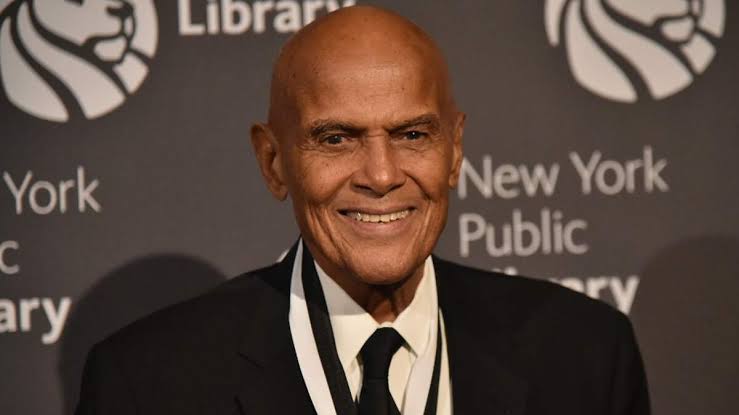Civil right activist & entertainer, Harry Belafonte passes on at 96

Harry Belafonte, the actor, producer, singer and activist who made calypso music a national phenomenon with “Day-O” (The Banana Boat Song) and used his considerable stardom to draw attention to Martin Luther King Jr., civil rights issues and injustices around the world, has died. He was 96.
Belafonte, recipient of the Jean Hersholt Humanitarian Award from the Academy of Motion Picture Arts and Sciences in 2014, died Tuesday of congestive heart failure at his Manhattan home on the Upper West Side with his wife, Pamela, by his side, longtime spokesman Ken Sunshine told The Hollywood Reporter.
A master at blending pop, jazz and traditional West Indian rhythms, the Caribbean-American Belafonte released more than 30 albums during his career and received a Lifetime Achievement Grammy from the Recording Academy in 2000.
Calypso, which featured “Day-O” and another hit, “Jamaica Farewell,” topped the Billboard pop album list for an incredible 31 weeks in 1956 and is credited as the first LP to sell 1 million copies. It was one of three albums he had that year that made it into the top 3.
On the big screen in the late 1950s, Belafonte was a matinee idol and rarely seen non-white sex symbol.
In the Darryl F. Zanuck-produced Island in the Sun (1957), his politician character is romantically pursued by a rich white woman (Joan Fontaine), a storyline that created much controversy (and big box office) at the time.
And in two films released in 1959, he played a bank robber opposite a racist partner (Robert Ryan) in Robert Wise’s Odds Against Tomorrow and survived a nuclear disaster — and then battled Mel Ferrer over Swedish actress Inger Stevens — in The World, the Flesh and the Devil. Both movies were financed by his own company, HarBel Productions.

Following an acclaimed Carnegie Hall two-night stand in April 1959, Belafonte won an Emmy for his Revlon Revue TV special, Tonight With Belafonte.
Belafonte — who found inspiration in such figures as Eleanor Roosevelt and Paul Robeson — helped round up celebrities for the Freedom March on Washington in 1963, when King delivered his historic “I Have a Dream” speech.
Later, he participated in the Alabama march from Selma to Montgomery (archive footage of him appears in the 2014 film Selma), performed in Paris and Stockholm for the first European-sponsored benefit concerts on behalf of King and sat alongside his widow at MLK’s funeral.
Belafonte was a driving force behind the nonprofit organization USA for Africa, which was launched to stamp out famine and spawned the mega-selling single “We Are the World,” which brought together such artists as Michael Jackson, Bruce Springsteen, Bob Dylan and Ray Charles. A year later, he masterminded the 1986 human-chain campaign Hands Across America, which benefited U.S. poor.
A Kennedy Center honoree in 1989, Belafonte also was active in efforts to end apartheid in South Africa and to release Nelson Mandela.

In 1954, Belafonte starred in Otto Preminger’s film adaptation of Oscar Hammerstein’s Carmen Jones, again with Dandridge, and was a Broadway sensation a year later in the song- and dance-filled 3 for Tonight.
After signing with RCA Records, Belafonte released two albums in 1956 that shot him to stardom: Belafonte, which also made it to No.1 on the Billboard charts, and the West Indian-flavored Calypso. (Mark Twain and Other Folk Favorites, which was released in 1954, leap-frogged to No. 3 that year)
“When I sing the ‘Banana Boat Song,’ the song is a work song,” Belafonte said in a 2011 interview with NPR. “It’s about men who sweat all day long, and they are underpaid, and they’re begging the tallyman to come and give them an honest count — counting the bananas that I’ve picked, so I can be paid. And sometimes, when they couldn’t get money, they’ll give them a drink of rum.
“There’s a lyric in the song that says, ‘Work all night on a drink of rum.’ People sing and delight and dance and love it, but they don’t really understand unless they study the song that they’re singing a work song that’s a song of rebellion.”
In 1956, Belafonte broke a 39-year record when he attracted a crowd of 25,000 to Lewisohn Stadium, an open-air auditorium on the campus of City College of New York since razed. He played The Palace in New York for 14 weeks and the Greek Theatre in Los Angeles for four, filling the venue to capacity at each performance (he released a live double album from a show there in 1963). And in 1971, he played a record 16-week engagement at L.A.’s Dorothy Chandler Pavilion.
“When Harry Belafonte strides out of semi-darkness into the spotlight of stage center at the Palace Theatre, the total effect will be theatrical but simple — deceptively simple,” The New York Times wrote in 1959. “The open-necked cotton shirt he wears, the lights which bathe his easy grace, the projected scenery, the musical effects, none of this will be there because of happenstance.”
Belafonte used his clout to bring Black entertainers into the spotlight by producing The Strollin’ Twenties, a 1966 musical remembrance of Harlem in its heyday for CBS that featured Duke Ellington, Sammy Davis Jr., Diahann Carroll, Nipsey Russell and Joe Williams, and the 1967 ABC project A Time for Laughter, which showcased comics Richard Pryor, Redd Foxx and Moms Mabley.
In 1968, he appeared with blond, blue-eyed English singer Petula Clark on her NBC special. During one song, Petula touched Belafonte’s forearm — the first time a Black man and white woman touched on primetime television, producer-director Steve Binder recalled in a 2004 interview — and that contact ignited a national controversy.

Five months later, Belafonte found himself in the eye of the storm again when, on the season-opening installment of The Smothers Brothers Comedy Hour, he performed an extended calypso medley as news footage of the riotous 1968 Democratic National Convention in Chicago played on a green screen behind him.
CBS took out the song “and inserted instead a commercial for [Richard] Nixon for president … we were furious,” Tommy Smothers recalled in a 2000 interview. “That piece was never seen on television.”
Belafonte co-starred with Poitier in Buck and the Preacher (1972), a Western that was produced by their respective production companies, and teamed again with his pal in Uptown Saturday Night (1974), this time playing a ghetto gang leader.
He portrayed famed football coach Eddie Robinson in the 1981 NBC telefilm Grambling’s White Tiger, was a bigot in White Man’s Burden (1995) and appeared as mobster Seldom Seen in Robert Altman’s Kansas City (1996) and as man who describes a lynching in Spike Lee’s BlacKkKlansman (2018).
He published a memoir, My Song, in 2011.
Belafonte was married three times — to nurse Marguerite Byrd, dancer Julie Robinson and photographer Pamela Frank. Survivors also include his daughters Shari, Gina (both actresses) and Adrienne and son David (a producer); stepchildren Sarah and Lindsey; and eight grandchildren: Rachel Blue, Brian, Maria , Sarafina, Amadeus, Mateo, Olive and Zoe.
In his NPR interview, he remembered what his mother had told him when he was 5, something that shaped his life forever.
“She was tenacious about her dignity not being crushed,” he said. “And one day she said to me — she was talking about coming back from the day when she couldn’t find work — fighting back tears, she said, ‘Don’t ever let injustice go by unchallenged.’ And that really became a deep part of my life’s DNA. A lot of people say to me, ‘When as an artist did you decide to become an activist?’ I say to them, ‘I was long an activist before I became an artist.’ ”
Source: Hollywood Reporter
Abeeb Lekan Sodiq is a Managing Editor & Writer at theafricandream.net. He’s as well a Graphics Designer and also known as Arakunrin Lekan.





